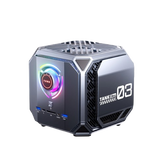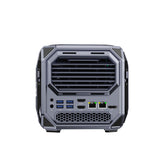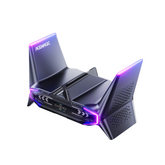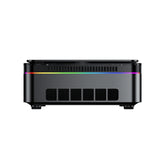Exploring the Pros and Cons of Mini PCs: Is It the Right Choice for You?

You considering switching to a Mini PC? Also referred to as compact desktops or small form factor PCs, Mini PCs have been gaining traction in recent years because of the unexpected performance offered by these tiny PCs. Here at this tutorial, we shall closely examine the advantages and disadvantages of Mini PCs—and help you decide if Mini PCs are the ideal solution for your home or business computing requirements.
You’ll also discover a trusted USA-based seller offering top-tier Mini PCs at affordable prices. Let’s explore the world of these pint-sized powerhouses.
Why Mini PCs Are a Game-Changer
In a tech landscape once dominated by bulky towers, Mini PCs have emerged as sleek, space-saving alternatives that don’t compromise on performance. These ultra-compact devices deliver comparable processing power to traditional desktops but in a fraction of the space.
For home consumers or organizations that need to maximize desk space, reduce power consumption, or realize a minimalist setup, Mini PCs are revolutionizing the way it is possible to work from a workstation. Whether you're working with office applications, viewing content, or handling light creative endeavors, Mini PCs offer functionality and capability in a diminutive package.
Perks of Mini PCs
-
Space Efficiency: Compact in size, ideal for small offices, minimalist workstations, and home theaters.
-
Affordability: Generally lower in cost, especially for small businesses, schools, and startups.
-
Energy Efficiency: Lower power consumption compared to conventional desktops, reducing electricity bills and environmental impact.
-
Portability: Easy to transport or relocate, suitable for remote workers or users needing flexibility.
-
Security: Some enterprise-grade models offer hardware-level encryption and access control.
-
Silent Operation: Fanless or low-noise cooling systems provide quieter working conditions.
-
Rapid Boot-Up: SSDs and modern processors enable fast startup times.
-
Configurable Options: Select models allow RAM, storage, and OS customization.
-
Flexible Applications: Can be used as media centers, POS systems, digital signage, or thin clients.
-
Low Maintenance: Fewer moving parts mean fewer failures and simpler upkeep—learn how to maintain your Mini PC with ease.
Mini PC Disadvantages
-
Limited Upgrades: Smaller chassis often restrict GPU or internal component upgrades.
-
Higher Initial Cost (per performance): Compact design and efficient components may increase unit cost.
-
Performance Ceiling: Not suitable for intensive tasks like 3D rendering, AAA gaming, or machine learning.
-
Graphics Limitations: Often rely on integrated or entry-level GPUs.
-
Thermal Management Challenges: Smaller cases can accumulate heat more easily.
-
Storage Constraints: Limited internal drive bays may require external storage solutions.
-
Fewer I/O Ports: Less space for USB, HDMI, or expansion ports.
-
Harder to Modify: Some components, such as CPU or GPU, are soldered and non-removable.
-
Less Cooling Headroom: Demanding workloads may push thermal limits.
-
Use-Case Specific: Not recommended for workstation-class needs or heavy development use.
Top Mini PC in the USA?
Trust ACEMAGIC – Your Compact Computing Companion
When you are ready to buy a Mini PC, trust ACEMAGIC.
ACEMAGIC offers a carefully curated selection of high-performance Mini PCs—perfect for customers who want reliability, modern looks, and great value. Each is software-tested for compatibility, and the lineup includes models powered by Intel and AMD processors, offering performance for daily tasks and business use.
No matter your role—home user, business owner, content creator, or student—ACEMAGIC has the right Mini PC for you, without breaking the bank.
Conclusion
In the ever-evolving world of computing, Mini PCs represent a powerful, space-saving solution that blends performance, portability, and efficiency. While not ideal for hardcore gamers or users needing extreme customization, for the average user, the benefits clearly outweigh the drawbacks.
Mini PCs FAQs
1. Is a Mini PC Worth Buying?
Absolutely, Mini PCs are worth buying for several compelling reasons. Despite their compact size, they offer powerful performance with advanced processors and high-speed RAM. Mini PCs excel in energy efficiency, consuming less power compared to traditional desktops. Their portability is unmatched, making them ideal for those on the go.
Additionally, these devices often come with versatile connectivity options, allowing seamless integration into various setups. With modern designs, customizable features, and a smaller environmental footprint, Mini PCs deliver a cost-effective, efficient, and future-proof computing solution that is well worth the investment.
2. What is the Difference Between a Mini PC and a Desktop?
A Mini PC is a compact, space-saving computer that packs the functionality of a traditional desktop into a smaller form factor. It typically has a smaller footprint and is designed for efficiency and portability. While it shares similar components with regular desktops, due to its compact size, it is well suited for home entertainment, office work, and light gaming.
3.What are the Key Advantages of Using a Mini PC?
Mini PCs offer several advantages, including space efficiency, energy efficiency, and portability. They are ideal for users with limited space, such as small apartments or offices. Mini PCs often consume less power than full-sized desktops, making them more environmentally friendly.
In addition to being compact, these computers are also easy to transport, which makes them an ideal choice for professionals who are always on the move or for those who need a secondary computer.
4. Can Mini PCs Handle Demanding Tasks Like Gaming or Video Editing?
While Mini PCs are generally not as potent as high-end desktops, many models are capable of handling moderate gaming and basic video editing tasks. It's essential to check the specifications of the specific Mini PC model, as some are equipped with dedicated graphics cards and powerful processors.
However, for intensive gaming or professional video editing, a traditional desktop with higher-end components might be more suitable.
5. How Do I Connect Peripherals to a Mini PC, Given its Compact Size?
Many mini PCs come with multiple connectivity options, including USB ports, HDMI or DisplayPort ports for monitors, audio jacks, and sometimes even Thunderbolt or USB-C ports. Bluetooth and Wi-Fi are also available as wireless connectivity options.
Similar to a regular desktop, you can connect peripherals such as a keyboard, mouse, external storage, and other devices. Ensure that the Mini PC you choose has the necessary ports for your specific needs.
6.Can I Upgrade the Components of a Mini PC, Such as RAM and Storage?
Mini PCs can be upgraded, but upgradeability depends on the specific Mini PC model. While some Mini PCs have components that can be upgraded, many are designed with integrated or soldered components to maintain a compact form factor.
Before purchasing, check the product specifications to see if it allows upgrades. If upgradability is crucial, consider choosing a Mini PC with user-accessible components or opt for models designed explicitly for customization.
7. Do Mini PCs Have Fans?
Yes. Some use fans for active cooling, while fanless models rely on passive heat dissipation. Generally, they operate more quietly than standard desktops, though models designed for higher thermal demands may incorporate liquid cooling systems, offering quieter and more efficient heat management compared to traditional air cooling.
8. What Are the Main Features of a Mini PC?
-
Small footprint
-
Low power usage
-
Multiple I/O options
-
Quiet operation
-
Lightweight design
-
Selective customization
9. Who Invented the First Mini Computer?
The first commercial mini computer was the PDP-8, launched in 1964 by Digital Equipment Corporation (DEC) and developed under the leadership of co-founder Ken Olsen.









Leave a comment
Please note, comments need to be approved before they are published.